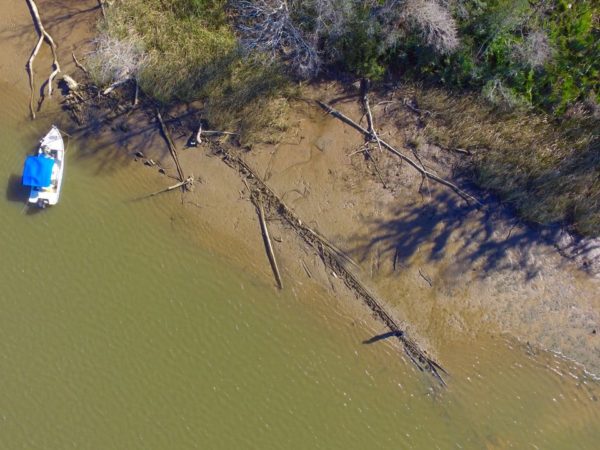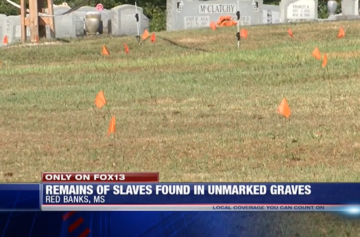
So far, archaeologists have only been able to examine the parts of the alleged Clotida that’s above the mud. (Photo by Ben Raines)
An AL.com reporter believes he may have stumbled upon the remains of the long-lost wreck of the Clotilda, the last ship known to have brought enslaved Blacks to America.
Much of what’s left of the grand vessel remains partially buried under the thick mud of the Mobile–Tensaw Delta, according to the news site, but almost the entirety of the starboard of the boat is fully exposed. Local reporter, Ben Raines, wrote that the wreck was uncovered during abnormally low tides caused by the so–called “Bomb Cyclone” that hit the Eastern Seaboard earlier this month.
“The remote spot where the ship was found, deep in the swampy Mobile-Tensaw Delta, is accessible only by boat,” he wrote.” … During my first trips after discovering the wreck, I documented it with photographs and aerials shot with a drone. And over the next week, I ferried a shipwright expert and a team of archaeologists from the University of West Florida to the site.”
John Sledge, a senior historian with Mobile Historical Commission, who worked alongside Raines “quaked with excitement” at the news of the potential discovery.
“This would be a story of world historical significance, if this is the Clotilda,” Sledge said. It’s certainly in the right vicinity … We always knew it should be right around here.”
The whereabouts of the wrecked slave ship have long remained a mystery, and few details were known, other than that the ship’s captain, William Foster, set fire to it around 1860 in an attempt to hide the fact that he was transporting slaves. According to AL.com, the boat had just delivered 110 enslaved Africans from modern-day Benin before Foster’s crew tried to destroy it. It was illegal, at the time, to import captives into the country, thanks to a law signed by Thomas Jefferson in 1808.
After being denied passage back to Africa, the enslaved workers made a home in the U.S. and created a community called “Africatown” just north of Mobile where they spoke their native tongue and farmed using traditional African methods. Their descendants, many of whom live in Africatown today, are thought to be the only group of slave descendants who know exactly where their ancestors come.
“There is nothing here to say this isn’t the Clotilda, and several things that say it might be,” University of Florida archaeologist John Bratten told the news site. Fellow archaeologist Greg Cook added that the boat showed telltale signs of being burned.
Thus far, the investigation into whether the boat is indeed the Clotilda is purely visual, as Alabama laws governing shipwrecks carry tough penalties. Permission to dig up the hull or remove old artifacts will require both federal and state permits — and “a lot of money.”
Read more about Raine’s discovery here.


